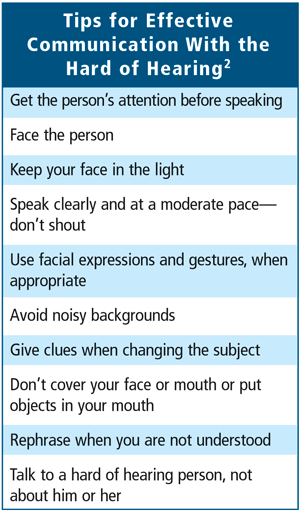Marian McLeod, MEd (Counselling), Manager/Supervisor, Hearing Care Counselling Program, The Canadian Hearing Society, Kingston Regional Office, Kingston, ON.
Seniors with long-term hearing loss find it progressively more difficult to understand conversation and remain involved in society. When hearing impairment combines with other disabilities, the result is to multiply, rather than only add to, the negative consequences.1 Poor vision, arthritis and other illnesses complicate the management of hearing loss. No hearing loss should be considered unimportant.
Acquired hearing loss in seniors is a hidden disability, yet is one of the most common chronic disabilities associated with aging. Acquired hearing loss in seniors may occur for a variety of reasons, including illness, head trauma, presbycusis, ototoxic medications, heredity, wax build-up in the ear canals or prolonged noise exposure. Hearing loss may be sensorineural or conductive. Presbycusis initially affects hearing of the high frequency range and eventually the low frequency range. Thus, at first it may be difficult to understand speech in a noisy room, but the disability can progress to the point where communication is difficult in all situations.
 Regardless of cause, hearing loss in seniors profoundly affects every dimension of their lives as well as their significant others.
Regardless of cause, hearing loss in seniors profoundly affects every dimension of their lives as well as their significant others.

 Regardless of cause, hearing loss in seniors profoundly affects every dimension of their lives as well as their significant others.
Regardless of cause, hearing loss in seniors profoundly affects every dimension of their lives as well as their significant others.